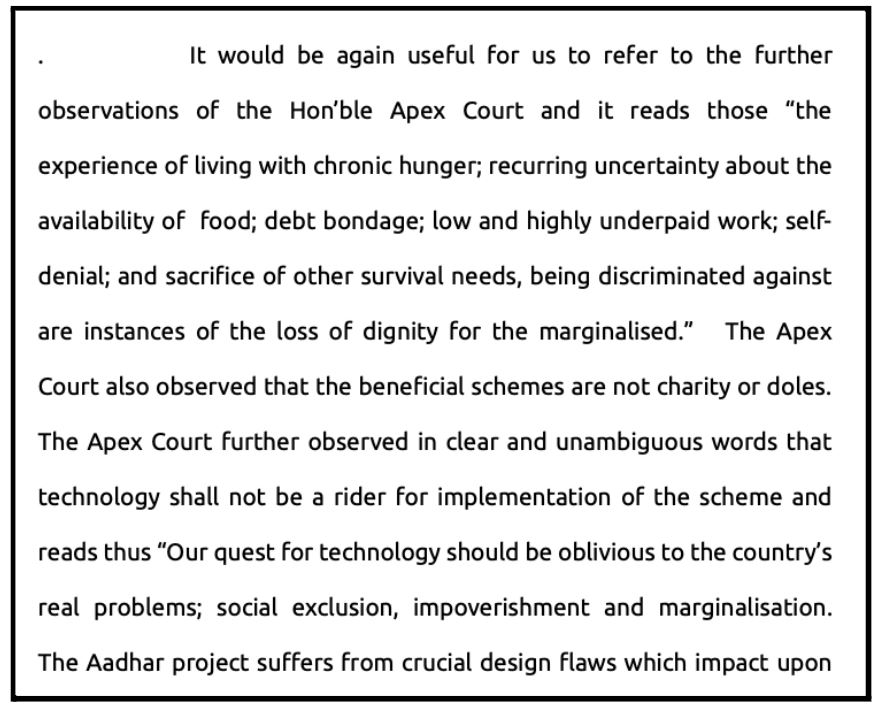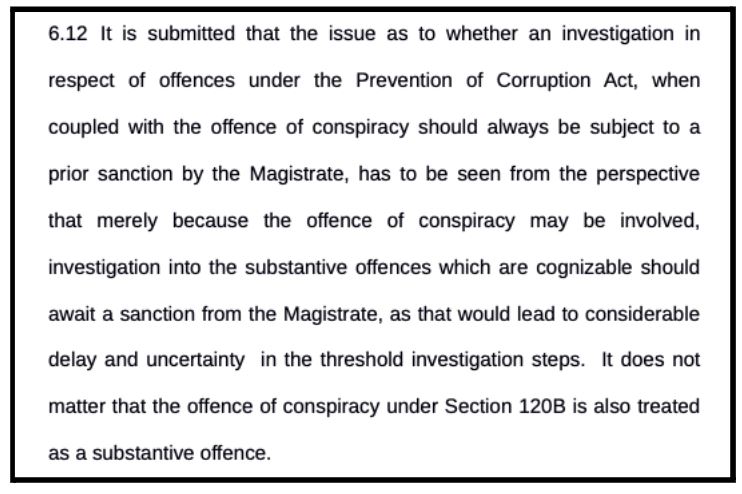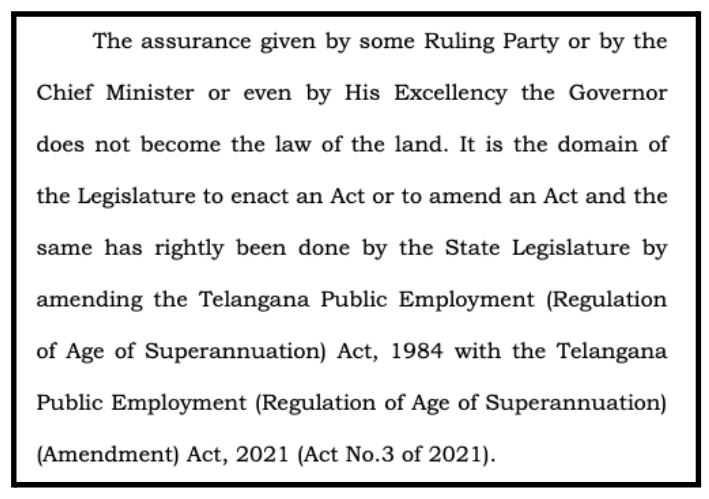In this roundup of court judgements, we look at Constitutional Courts’ remarks & directions about exclusionary provisions under the National Food Security Act, sanction of magistrates in corruption-related offences, assurances by political leaders, and age determination of juveniles in conflict with the law.
Bombay HC: Lack of Aadhaar linkage no reason to deny benefits under Food Security Act.
In the case Ganpat Dharma Mengal & others vs. Tehsildar Office, Murbad and Others, the Bombay high court observed that there is no rationale for denying the benefits of distribution of food grains under the National Food Security Act, 2013 (NFSA) to tribals on certain technical grounds.
The high court noted that several tribals were denied supplies under the Public Distribution System due to the non-linking of their Aadhar Cards and ordered the Tehsildar of Murbad to distribute supplies to nearly 90 tribals by 04 November 2021.
The State claimed that the Aadhaar cards of the concerned individuals were linked to a different place than the residence. This was the reason behind non-distribution. The State also cited a government circular (GO) from October 2013, which mentions that the Aadhar of every family member in the ration card must be linked to the portal for the benefits of PDS.
The bench of Justices Prasanna Varale and Madhav Jamdar observed that the requirements in the state’s GO are in stark opposition to a central government notification dated 08 February 2017, which clearly states that the Aadhaar Card is only one of the criteria for identifying the Beneficiary, not the sole criteria.

According to clause 5 of the centre’s notification, any member of an eligible household listed in the ration card shall be entitled to receive the entire quantity of cash transfer or food subsidy under NFSA, if even one member fulfils the identification conditions, in case of Aadhaar number is not yet assigned to all.

Therefore, the high court ordered the distribution of food grains to tribal beneficiaries in Murbad Taluka under NFSA and Pradhan Mantri Garib Kalyan Anna Yojana, after verifying their ration cards. The court also ordered aid to be given to similarly placed tribals in the state.
Supreme Court: Prior sanction of magistrate not mandatory for investigating non-cognizable offence along with cognizable offence.
In the case State of Jammu and Kashmir vs. Dr. Saleem ur Rehman, the Supreme Court held that prior sanction of the Magistrate is not mandatory for investigating a non-cognizable offence along with a cognizable offence.
The supreme court was hearing an appeal against a judgement passed by the Jammu and Kashmir high court, where it quashed FIR under J&K Prevention of Corruption (PC) Act and criminal conspiracy under Section 120B of Ranbir Penal Code. The FIR was quashed observing that prior sanction of the Magistrate as per Section 155 of the J&K Code of Criminal Procedure was not obtained for investigating the offence of criminal conspiracy, which was non-cognizable as per the Ranbir Penal Code. Among other grounds, the high court also held the delay in completing preliminary enquiry was a reason to quash the case.
The bench of Justices MR Shah and AS Bopanna observed that the high court had erred in holding that sanction of the Magistrate was required to investigate the non-cognizable offence (in this case Section 120B RPC), as the offences under the Prevention of Corruption Act were cognizable.

The bench opined that the offence under the Prevention of Corruption Act is a substantive offence. Therefore, when the investigation in respect of the offence under the PC Act, is coupled with the offence of conspiracy, there is no requirement of prior sanction of the Magistrate.
Further, the apex court also observed that merely because some time is taken for conducting a preliminary enquiry, it cannot be a ground to quash the criminal proceedings for an offence under the Prevention of Corruption Act.
Telangana HC: Assurance by the chief minister, the ruling party or even by the governor does not become law of the land.
The Telangana high court observed that an assurance was given by the ruling party or Chief Minister, or Governor does not become the law of the land.
The high court was hearing a batch of petitions seeking retrospective implementation of the State Government’s decision to enhance the retirement age for government jobs from 58 or 60 years to 61 years. The State Legislature passed the Telangana Public Employment (Regulation of Age of Superannuation) (Amendment) Act, 2021, under which the age of superannuation of public employees had been enhanced from 58 years to 61 years.
The State Government notified that the said Act shall be deemed to have come into force on 30 March 2021. This meant that the employees who were due to retire on 30 March or later, were entitled to the benefit of the Act.
Challenging the Government order, some retired employees (who retired prior to 30 March) moved to the High Court claiming that they had been discriminated against by the Government and the Amending Act of 2021.
The petitioners also claimed that in 2018, the ruling Telangana Rashtra Samithi (TRS) Party gave an assurance at the time of elections for enhancing the age of superannuation of Telangana Government employees to 61 years. Further, in 2021, the Governor of Telangana made a promise about the enhancement of the retirement age in a Republic Day speech.
Therefore, the petitioners submitted that once a promise has been made by the State Government for enhancing the age of superannuation from 58 years to 61 years in 2018 itself (at the time of Assembly Elections), the State Government cannot deny the benefit of enhancement in retirement age.
After examining all submissions, the high court observed that fixation of a cut-off date always leaves a large number of employees unsatisfied. Therefore, it does not warrant any interference.

The bench of Chief Justice Satish Chandra Sharma and Justice A. Rajasheker Reddy held that the enhancement of superannuation age is a policy matter. The bench reiterated that any assurance was given by the ruling party or Chief Minister, or Governor does not become the law of the land. In conclusion, the writ pleas were dismissed.
Delhi HC: Delhi high court issues timeline for completing ‘age determination’ of ‘juveniles in conflict with law’.
The Delhi high court on its own motion issued directions for streamlining the process of inquiries relating to juveniles in conflict with the law and scrupulous compliance by all authorities.
The high court was dealing with questions of law placed by a Principal Magistrate of a Juvenile Justice Board regarding circumstances where a child in conflict with the law also happens to be a child in need of care and protection under the aegis of Juvenile Justice Act.
The high court granted the Delhi Government 4 weeks to furnish information of petty offences pending before all Juvenile Justice Board (JJBs) in Delhi between six months and one year, including the number of cases, date of institution of inquiry and date of the first production of the juvenile before the JJB.
The bench of Justice Siddharth Mridul and Justice Anup J Bhambhani issued the following directions:
- In all cases pertaining to juveniles in conflict with the law, regardless of the nature of offences alleged, the Investigating Officer shall collect and file before the JJB requisite documents towards proof of age of the juvenile within 15 days from the date of issuance of such directions.
- In all cases pertaining to juveniles in conflict with the law, regardless of the nature of offences alleged, the Investigating Officer shall ensure that the ossification test in relation to the juvenile is completed, a report is obtained and filed before the JJB within 15 days from the date the ossification test is ordered by a JJB.
- All persons/educational institutions/medical institutions/governmental authorities to whom a request is made by an Investigating Officer for providing documentation towards age-determination or for conducting ossification test on a juvenile shall undertake necessary procedures and processes to enable compliance with the timelines set out above.


